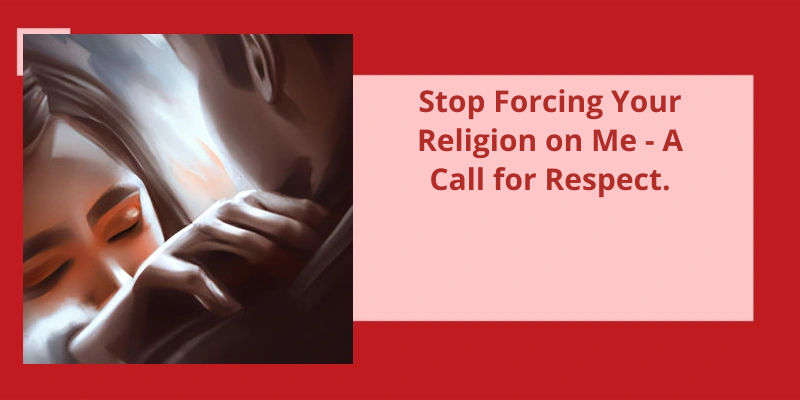Religion, a topic that’s sparked many debates and controversies over the years, is often the cause for high tensions between individuals and communities. While it’s been a source of comfort and guidance for many, the practice of pushing one's religious beliefs onto others has been received with great disapproval. Whether it's through verbal persuasion, aggressive conversion tactics, or simply forcing others to conform to religious practices and traditions, the act of imposing one's religion on others is a violation of personal boundaries and liberties. In a world where diversity and freedom of choice are embraced and encouraged, it’s imperative that we respect each other's beliefs and opinions, and stop forcing our religion on others.
What Is It Called When Religion Is Forced?
It’s the practice of using coercion, violence or threats to force individuals or groups to abandon their religious beliefs and adopt a new faith against their will. Forced conversion is a violation of human rights, religious freedom, and personal autonomy.
Historically, forced conversion has been used as a tool of political and military conquest. In many parts of the world, colonizers and conquerors used conversion as a means of control, imposing their own beliefs on the people they subjugated. Religious minorities have also been the target of forced conversion campaigns, often as a result of persecution and discrimination.
The practice of forced conversion is particularly prevalent in countries with strict religious ideologies, where dissent or deviation from the official faith is punished severely. In some countries, such as Saudi Arabia, it’s illegal for Muslims to convert to another religion, and conversion is punishable by death. In other countries, such as India, religious minorities are often targeted by extremist groups, who use violence to force them to convert.
It’s a threat to diversity, pluralism, and peaceful coexistence. By working to prevent forced conversion and promote religious freedom, we can help build a more just and equitable world for all.
Understanding the boundaries between your beliefs and those of others can be a delicate balance. Imposing your own beliefs on others can be considered an intrusive act that disregards the autonomy and individual choices of others. It’s crucial to respect the differences in individuals and their beliefs, as well as being open to learning from others. In this article, we’ll dive deeper into what it means to impose your beliefs on someone and explore ways to effectively communicate without overstepping those boundaries.
What Does It Mean to Impose Your Beliefs on Someone?
Imposing your beliefs on someone refers to the act of attempting to make others accept the same values, ideas, or opinions that you hold. The term is often used in a negative context because it implies that you’re forcing your beliefs onto others without their consent, which is seen as disrespectful and unethical.
One of the negative consequences of imposing your beliefs on others is that it can create a sense of resentment and friction. When someone tries to pressure or manipulate you into adopting their worldview, it can feel like an attack on your autonomy and individuality. This can lead to feelings of frustration, anger, and mistrust, which can damage relationships and reduce the potential for meaningful dialogue and mutual understanding.
Another problem with imposing your beliefs is that it can lead to intolerance and bigotry. When we become too fixated on our own beliefs, we may start to see other perspectives as inferior or threatening. This can lead to a narrow-minded view of the world that prevents us from appreciating the diversity of experiences and ideas that exist. When we impose our beliefs on others, we may unwittingly contribute to a culture of intolerance and discrimination.
For example, if a boss tries to force their religious beliefs on their employees, it could lead to discrimination and legal issues. Similarly, if a parent tries to prevent their child from accessing healthcare or education because of their religious beliefs, it could lead to harm or neglect. In these situations, imposing your beliefs can have serious consequences that affect the well-being of others.
Overall, imposing your beliefs on others isn’t a helpful or productive approach to creating change or influencing others. Instead of trying to force others to accept your ideas, it’s more effective to engage in open and respectful dialogue that allows for the sharing of different perspectives. By listening to others and being willing to learn from their experiences, we can create a culture of understanding and collaboration that benefits everyone.
How to Avoid Imposing Your Beliefs on Others
- Listen actively to others before sharing your opinions
- Acknowledge the validity of other perspectives
- Be open to learning from others
- Avoid imposing your beliefs through force or coercion
- Respect the autonomy of others to make their own choices
- Be mindful of power dynamics that may influence the conversation
- Cultivate empathy and understanding for differing viewpoints
- Recognize and challenge your own biases and assumptions
- Encourage open dialogue and constructive disagreement
- Seek common ground and shared values
Source: Impose definition and meaning | Collins English Dictionary
Conclusion
In a diverse and multicultural society, it's important to respect each other's beliefs and values. Forcing one's religion on others can lead to division and conflict, and it undermines the principles of tolerance and freedom. Whether you’re a believer, an atheist, or simply undecided, you’ve the right to choose your own spiritual path and to live according to your conscience. It's essential to recognize that no one has the monopoly on truth, and that different cultures and faiths can coexist peacefully if we open our minds and hearts to each other. Thus, let’s embrace empathy and understanding towards others, and refrain from imposing our own beliefs on them. By doing so, we can create a more harmonious and inclusive world, where each person is accepted as they are.






